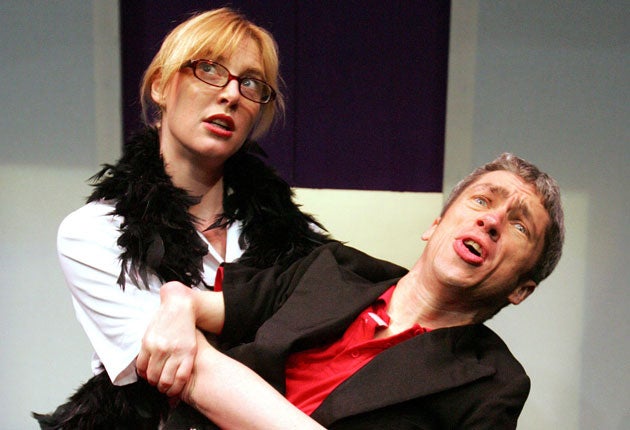Murders: The musical - a question of taste
Is there no subject they can't make a song and dance about? Genevieve Roberts on the strange case of the Suffolk Strangler

"Taste is the enemy of creativeness," claimed Picasso, who designed stage sets when not painting on canvas. The uneasy relationship between taste and the stage regularly provokes controversy. The latest has not even waited for the curtain to rise. This week theatre audiences will be invited to applaud a musical treatment of the brutal death of five prostitutes in Ipswich by the so-called Suffolk Strangler in 2006. London Road, named after the street where the mass murderer Steve Wright lived, opens at the National Theatre.
The Reverend Andrew Dotchin, who knew Tania Nicol, one of the victims, said people in Ipswich were "distressed" that the subject had been given the song-and-dance treatment. "There has been very little consultation between people putting on the event and those whose grief they're portraying," he said. "The writer is said to have done extensive research, but we are not aware of her speaking to the families."
A spokeswoman for the National Theatre confirmed that Alecky Blythe did not speak to the families, but said she "spent a lot of time in Ipswich and obviously spoke to residents".
Mr Dotchin said that while people should be talking and writing about the events, he questioned whether anyone should be putting it on stage so soon. "Everyone who I've spoken to has said, 'What?' and 'How dare they?' People are asking, 'Is somebody making money out of our grief?' I don't think that's the motive at all, but that's how it looks."
He said he hopes audiences will be given the opportunity to contribute to the Somebody's Daughter Memorial fund, set up in Ipswich after the tragedy. He suggested an optional donation added to the ticket price.
The philosopher A C Grayling, who argued against censorship in his book Ideas That Matter, believes the content of the play is entirely a matter of taste. "Everything depends on how it's done," he said. "No subject should be off-limits, as long as it's tasteful, as it helps us to explore our understanding – and it's important for society to explore within ourselves, and learn from events. Theatre, drama and documentaries all promote discussion."
Matt Wolf, theatre editor for the The Arts Desk website believes all subjects are fair game: "Surely, in our post-Sondheim musical/opera landscape, there's no one topic off-limits, as long as it is in the hands of artists – which is to say, I would not be keen to watch a musicalised snuff film. Which, I am sure, this will not be."
Aleks Sierz, author of In-Yer-Face Theatre, said: "Contemporary theatre should be creating new and challenging forms to express the rather troubling facts of our lives, which include the ugly subjects of serial killings and perversion. One of the most memorable shows of the past decade was Jerry Springer: The Opera. That caused controversy, because of its provocative images of Jesus Christ and the Virgin Mary. Controversial art is good; audiences should be challenged; artists should experiment. The alternative is dead art."
A spokeswoman for the National Theatre said the piece, created from edited interviews recorded with people from Ipswich and directed by Rufus Norris, does not seek to "exploit or sensationalise". She said: "It is a serious look at the effect on the community of this tragic event."
Caroline McGinn, theatre editor of Time Out, agrees: "People understand fiction and reality are different," she said. "Make art – but when there are still living victims or relatives around, you'd better make sure it's good art."
Bat Boy: The Musical
The 1992 news about a half-boy, half-bat, found living in a cave and given the imaginative moniker "Bat Boy" was given the song-and-dance treatment. It opened in Los Angeles in 1997, and has since been performed at the Edinburgh Festival and at the Shaftesbury Theatre in London's West End in 2004.
Anne Frank
In the late 1980s, the musical Yours, Anne was performed in the US. Then, in 2008, a €3m (£2.7m) musical based on the schoolgirl's Holocaust diary – Ana Frank Un Canto a la Vida – caused controversy before being performed in Madrid.
A New Brain
William Finn's autobiographical account of his own battle for life when he was afflicted with a seemingly terminal illness. The main character is in a coma with a deadly brain disorder for part of the show. Performed at Edinburgh Fringe Festival in 2005.
Plague: The Musical
The musical about fictional Clive Hucklefish – who comes to London to seek his fortune, but ends up inadvertently unleashing the bubonic plague – proved a sell-out in Edinburgh in 2008.
Jack the Ripper: The Musical
The East End murders of 1888 were set to music and performed at The Little Theatre in Donnington, Shropshire, in November 2005. Another version played in New Jersey in 2008 and is expected to be staged in London soon.
Thalidomide!! A Musical
Story of the anti-morning sickness drug given to pregnant women in the 1950s that resulted in babies being born disabled. Mat Fraser's 2006 musical comedy at Battersea Arts Centre included songs such as "It's Hard To Hitch Down Life's Highway With No Thumbs".
Bookmark popover
Removed from bookmarks